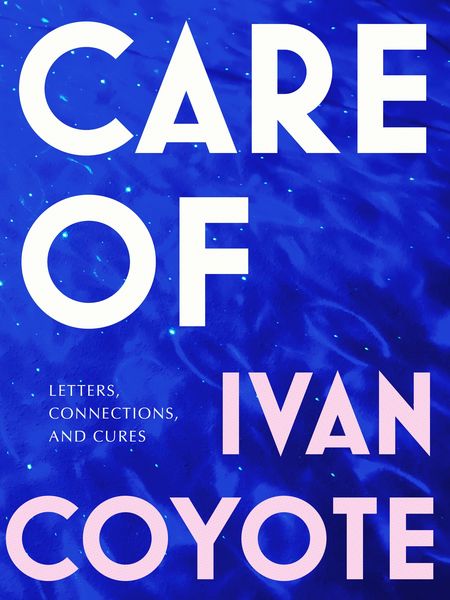Book Therapy: Care Of
By Stacey May Fowles
“I never set out to be a queer author. I really didn’t. I just loved writing and especially telling stories. I know now in retrospect that I was feeding and watering a vast and hollow space inside myself—an old mirror in a haunted house that did not reflect anything when I looked into it.”
—Ivan Coyote, Care Of
The other day I was having a conversation with a friend who works in publishing, specifically about how it sometimes feels like books generally fall into two distinct categories.
The first category is made up of books that are a sort of performance. While you’re reading them, you get the sense that the author is showing you what they can do, that they’re impressing you with their style and talent, that they’re proving themselves on the page. There’s certainly nothing wrong with books like this—I’ve enjoyed many of them in my lifetime, been awed by their innovation, been delighted and dazzled by their triumphs. They’re found on bestseller lists, have been loved and awarded and buzzed about.
But there is a second category of book I admit I’ve always had a preference for. The kind that, instead of requesting an audience, seem to form a sort of covenant with the reader. They don’t make you feel like you’re watching grandeur on stage, but instead like you’re sitting down in a quiet, safe place with the writer themselves. Like you’re sharing a secret, or a deep connection, or are simply feeling cared about and seen.
This latter category feels rare these days, even though, in a world that currently feels all about distance, we yearn for that closeness more than ever. Thankfully Care Of, the moving new non-fiction offering from acclaimed writer and storyteller Ivan Coyote, is exactly one of those kinds of books.
***
In Spring 2020, Ivan Coyote’s usually robust tour schedule ground to a halt. As news of the pandemic hit, they found themselves sheltering at their partner’s house in London, Ontario, unable to do the work they love. After decades of being on the road, travelling the world and telling vital stories, Coyote had to stay put.
“(T)he pandemic has taught me…how much I took all that road for granted,” the author writes. “Which, should all that road ever stretch out in front of my wheels in our currently unforeseeable future, I sincerely promise to never do again.”
Your CanLit News
Subscribe to Open Book’s newsletter to get local book events, literary content, writing tips, and more in your inbox
As the previously booked dates on the calendar started to dissolve, Coyote shifted gears, turning to correspondence as a way to serve the need to create. Opening up a diligently kept file of letters, emails, and Facebook messages from readers and audience members, they sat down not only to reply, but to tell a larger story.
Care Of is the end result of this unique project, an intimate book of letters that shows the necessity of connection, whether during a pandemic and otherwise. The author writes back to a number of individuals with varied reasons for reaching out, but in some ways is really writing to all of us—about despair and joy, about rejection and acceptance, about cruelty and compassion.
“These letters, and the people who wrote them, were a lifeline for me,” Coyote tells us. “An antidote, a cure for the sudden stillness of the wheels under me. Our stories can still travel, I tell myself every morning, watching the weeks wax and then wane through our kitchen window.”
One letter writer mourns the tragic loss of a daughter to suicide. Another shares the grief that comes with the passing of a best friend of fifty years. There is a letter about coming out as trans to friends, about the first time presenting as feminine in public. Another explains that top surgery “was the best thing I’ve done for myself and couldn’t be happier.”
Coyote returns the generosity of every correspondence, delving into their own personal stories and emphasizing the genuine power that comes with sharing them; “(T)hey can tear me up on their way out of me, but they rarely leave a scar. I am healed in a way, just by the telling.”
In the days before I got my first shot of the COVID vaccine I felt a rise of panic. I’m sure that part of my reaction was irrational fear—after waiting so long for that moment, after so many months of stasis, I was worried that my turn would be sabotaged. But there was something else in what I was feeling that I couldn’t quite unpack at the time, something about the future that inexplicably unnerved me.
As much as there is a lot of joy about the coming return to “the road,” there is also a great deal of anxiety. Many are worried that, when the pandemic draws to whatever close it will, we will go back to the flawed time that came before. That by default, we’ll return to the grind we once knew, even if that grind was actively harming us. That we will lose the knowledge, care and compassion we’ve gained, and forget everything we have learned about what really matters.
Perhaps there is a chance here to create something better. Like Coyote so aptly writes, “I want us to build a world where each and every one of us is supported and encouraged to live up to our full and unabridged, unsqueezed, and untrampled human potential.” That seems like the kind of world worth returning to.
While I was reading Care Of, I couldn’t help feeling this is the kind of book we need to mark our experience of the last fifteen months. It reminds us that even with all the loneliness and grief we’ve experienced, there was a closeness deliberately fostered, a slowness accepted and even celebrated, a kindness embraced. Coyote has written something that honours a time where every link to someone else felt holy, created a way to remember the lean, small, quiet pandemic days that will become lost to memory soon enough.
“I did not realize until several months into sheltering at home just how deeply exhausted I was. How much I had normalized jet lag and gotten used to my heart pumping empty blood back into my veins. How much I needed to sit down in one spot and just think. How much I needed this time to consider, compare, catch up, collect my thoughts.”
***
One of Care Of’s letters arrives on Coyote’s windshield after a 2019 gig at the Belfry Theatre in Victoria. Scrawled in blurry blue ink on the back of a flyer, the correspondence offers a pretty good explanation as to why Coyote’s work, both on stage and on the page, is so compelling.
“Well, I’m the kind of person that quietly leaves notes saying how much you touched us,” it reads. “How much you are the story of triumph that I want to hear more of.”
Thinking back on Coyote’s promise to not take the road for granted, I feel like this book goes a long way to fulfilling it before that road has even opened up again. In fact, Care Of does one of the best and most beautiful things I believe a book can do—it reminds us why we love writing, why we love reading, why we love life and each other.
“I think a storyteller who lost their tenderness could only really be called a historian,” writes Coyote. “So I am grateful now that I could never rid myself of mine.”
Book Therapy is a monthly column about how books have the capacity to help, heal, and change our lives for the better.
The views expressed by Open Book columnists are those held by the authors and do not necessarily reflect the views of Open Book.
Stacey May Fowles is an award-winning journalist, novelist, and essayist whose bylines include The Globe and Mail, The National Post, BuzzFeed, Elle, Toronto Life, The Walrus, Vice, Hazlitt, Quill and Quire, and others. She is the author of the bestselling non-fiction collection Baseball Life Advice (McClelland and Stewart), and the co-editor of the recent anthology Whatever Gets You Through (Greystone).





